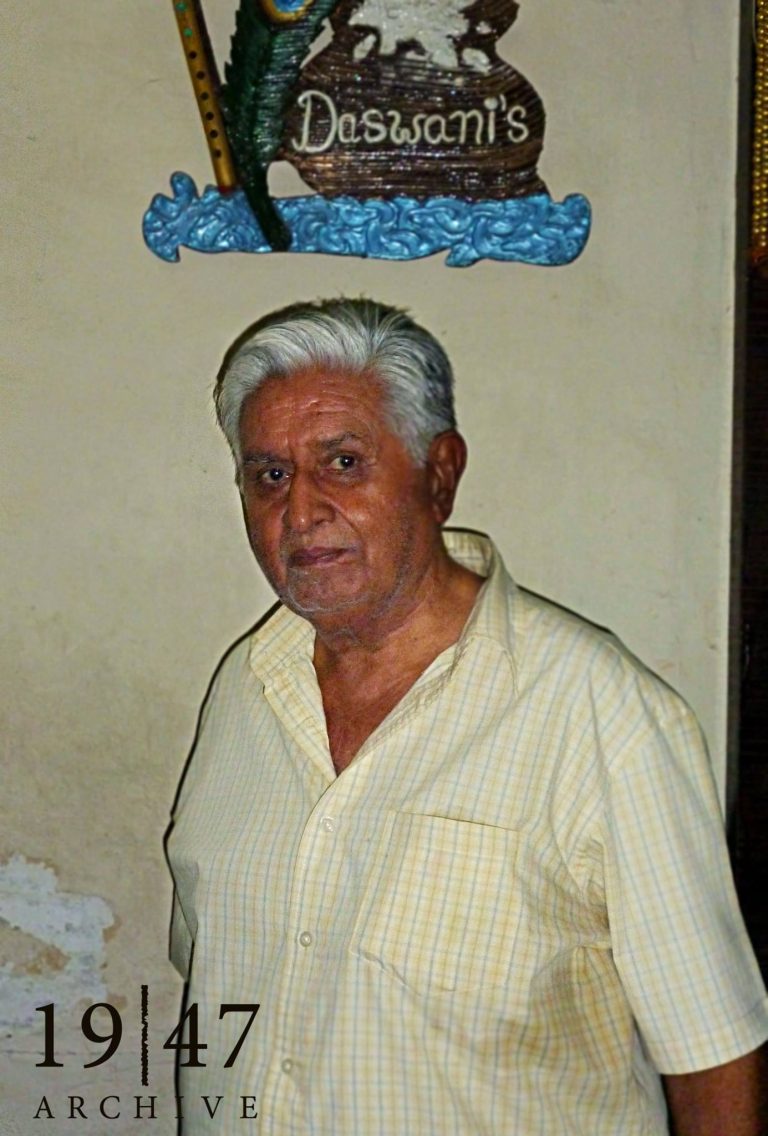
Daswani remembers the day his family boarded steamer in Karachi headed for Mumbai, as their friends bid them farewell.
By Citizen Historian Ankit Baria
Issardas Jotumal Daswani was born in Sukkur, Sindh in 1936. He lived with his brothers, parents and paternal uncle. His father was a construction contractor and their family was financially stable according to Daswani. They lived in a three-story building made of bricks and plastered with limestone. His family occupied the upper two floors and the lower floor was occupied by two tenants who would pay them a rent of two rupees each per month.
As a young boy, Daswani enjoyed his daily routine of walking all the way to school and back. He attended a boys-only school and their uniform consisted of white Sindhi shirts with round-cut edges and khaki shorts. He and his friends would always keep the shirt out instead of tucking it in, Daswani recalls. He attended school there until the age of 11.
One day in 1947, his elder brother’s two friends came to their house and informed them about Partition. They said that it was time for him and his family to leave Sukkur for safety. Daswani’s family, along with his uncle and his brother’s two friends, moved from Sukkur to Bandar Road, Sindh. They stayed there for a brief period and then went further from Bandar Road to Karachi. His brother’s friends were a constant support to them during the journey.
From Karachi, Daswani’s family traveled on steamers and the two friends bid them goodbye. These steamers brought them to Mumbai. Daswani says that there were decent arrangements for people who disembarked these steamers and there were a lot of volunteers and officials to help and guide them. However, the family thought that this displacement was temporary and that they would go back once things settled down.
Daswani does not recollect the exact amount but remembers that they had come to Mumbai with a little gold and some money. However, these resources were exhausted in the six months that they traveled around the country to visit various relatives. At the end of six months, it was clear to them that there was no going back. His father decided that the family would return to Mumbai and they moved to the Ulhasnagar Camp. The living conditions were humble and the military and other officials there were very helpful, he recalls. He further recollects that the locals of the area also had a warm and welcoming approach towards these displaced families.
After moving to Ulhasnagar, Daswani went to a school in Vithalwadi and continued his studies there until his matriculation, after which he worked various jobs. Later, he married his wife, who also stayed in the same locality and belonged to a family from Sindh. They had a son and a daughter.
At 18 years old, Daswani got a job at the Ministry of Rehabilitation in Delhi. He worked there for four years and was transferred to Mumbai. He continued his job until retirement and in due course got a transfer to the Food Corporation of India. During his working days, Daswani’s goal was to earn as much money as he could for his family. He took contracts of electrical jobs for buildings and worked on them before and after his job hours. He did many other small jobs to further his goal.
Daswani shared that he led a contented life in Ulhasnagar, Maharashtra. He set up a small factory of door laminates, which his sons and his partners manage. Daswani wakes up early in the morning and makes himself a cup of tea; he sits alone in the dark living room, waiting for the sun to rise. During this time, he says he often reflects on his life so far.
______________
[Interview was conducted in 2017]
Courtesy: Facebook Page of ‘The 1947 Partition Archive’